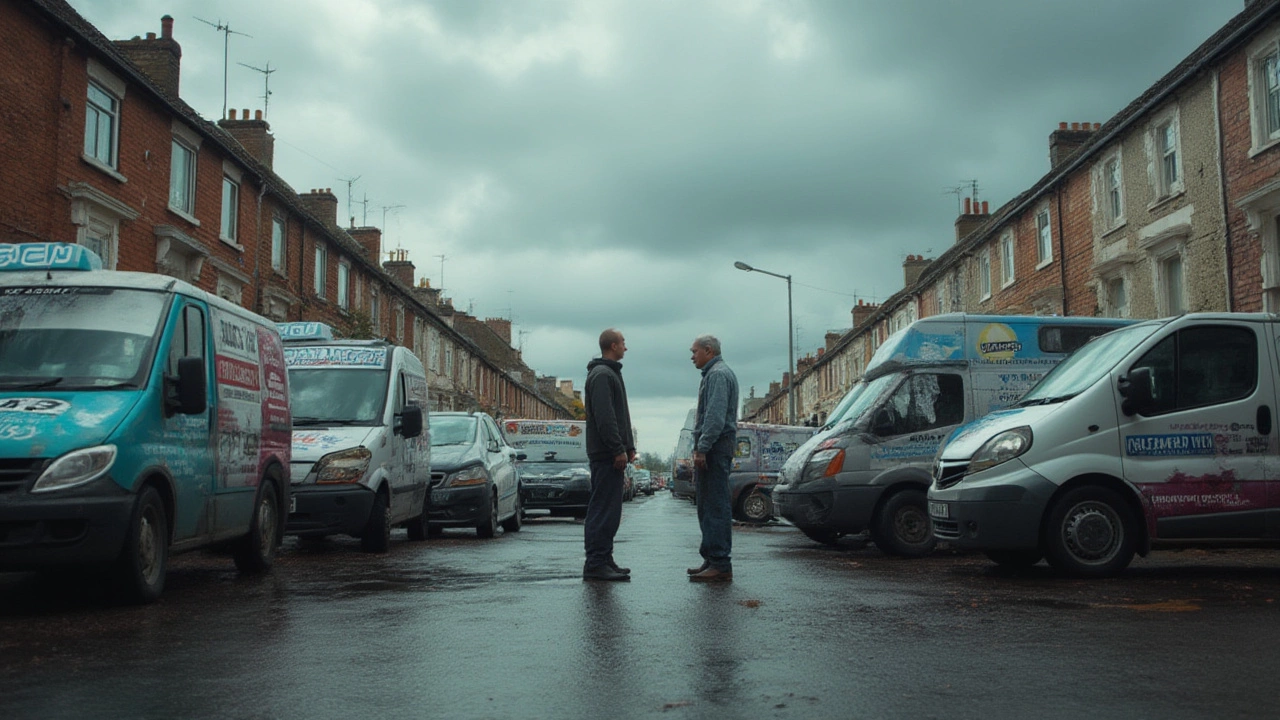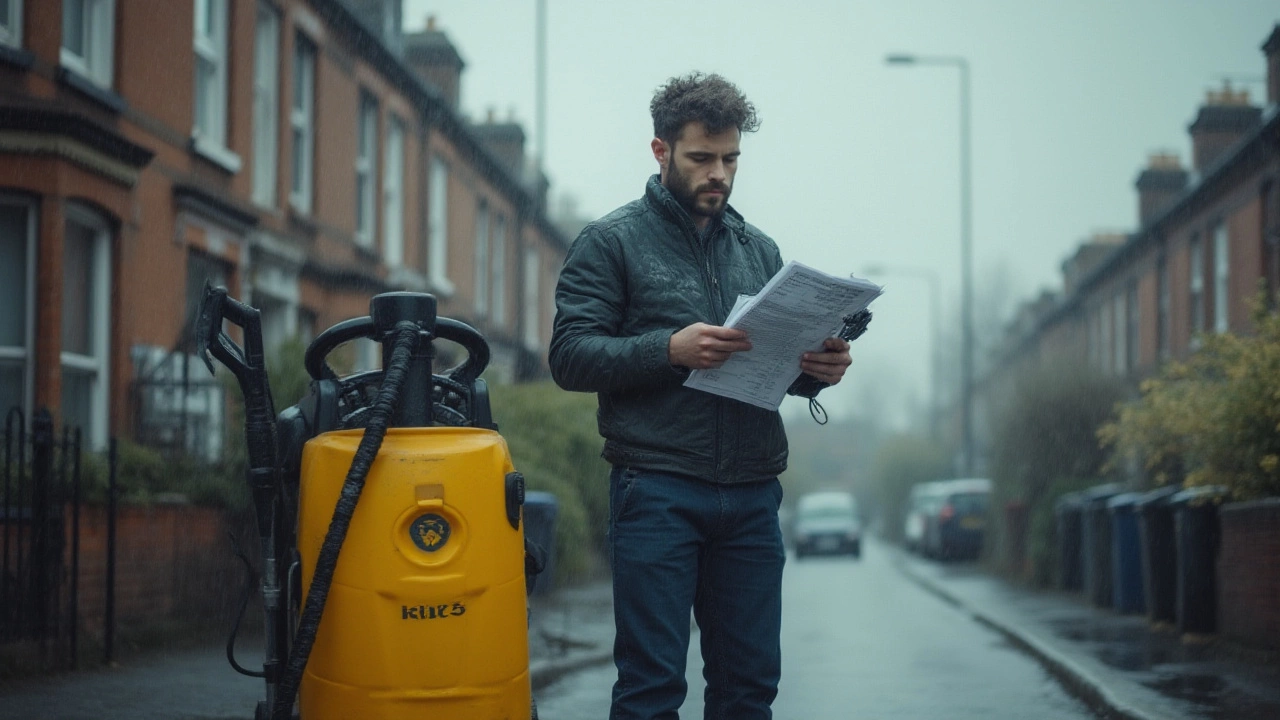Think pressure washing is a goldmine? It seems like an easy ticket to a tidy income—just fire up the machine and blast away grime. Reality check: it’s not that simple. The internet is flooded with videos showing people earning hundreds a day, but the side they rarely show is all the mess behind the scenes. Let’s dig deep into the cons, not just to rain on parades, but to prep you for what you’re really getting into.
The Trouble With Startup Costs and Equipment
One of the first things that catches new business owners off guard is how expensive pressure washing can be to get off the ground. You can buy a cheap pressure washer for under £100, sure. Want one built for serious work, though? Professional machines cost anywhere from £800 to over £4000, and that’s before you even look at accessories. Extension hoses, soft washing kits, surface cleaners—the bill racks up fast. Don’t forget regular repairs and replacing worn parts—rotating nozzles, high-pressure hoses, and pumps just don’t last long under heavy use.
Many folks don’t realise you’ll also likely need a commercial vehicle or trailer to lug your kit around, since most home washers won’t fit in the boot of a hatchback. Then there’s insurance—public liability insurance isn’t just smart, it’s often required. The average premium for new UK cleaning businesses in 2024 was £296 per year, and that’s just covering claims from clients. Insuring your gear against theft or damage hikes that cost further.
Don’t skimp on water supply options, either. Residential jobs might let you use the client’s tap, but some city bylaws in the UK restrict this, or the customer has weak pressure. A water tank (about £150 for a small 250-litre one), plus water recovery equipment (especially if you want commercial jobs or want to avoid fines), are hidden costs that really add up. This isn’t pocket change stuff—startup costs can easily hit £5,000 by the time you’re properly set up for commercial gigs.
It’s not just about what you buy upfront. Pressure washers themselves have high wear-and-tear rates. On average, a commercial-grade machine doing daily work needs servicing every 6 months. Cheap out at the start and you’ll pay at least twice, maybe more, down the line.
Here’s a quick look at the rough initial costs most people face starting out in the UK:
| Item | Estimated Cost (£) |
|---|---|
| Commercial pressure washer | 800 - 2,500 |
| Hoses, lances, nozzles | 200 - 600 |
| Water tank | 150 - 500 |
| Van or trailer | 2,000 - 10,000 (used) |
| PPE and safety gear | 100 - 400 |
| Insurance (public liability/year) | 200 - 400 |
Hard Lessons About Physical Demands and Personal Safety
Watching pressure washing videos makes it look easy—just spray and watch the dirt vanish. But after hours on your feet dragging heavy hoses, you’ll feel every muscle. Even a moderate commercial washer, such as a Honda GX390 setup, weighs over 30kg, and you’ll lug that out every job. Hoses get heavy too, especially dragged across a block of patios or commercial car parks. Mist from the high-pressure spray makes it easy to slip, and another little-known fact: jets can slice through skin faster than a kitchen knife.
Long jobs in unpredictable British weather are an ordeal. Sunburn in July, frozen hands in December, or working soaking wet for hours. Pressure washing isn’t for anyone squeamish about mud, grime, algae, or bird droppings—much of the work is downright filthy. If you’re prone to back pain, joint problems, or breathing issues, think twice. Jetting off old paints, chemical stains, mould, or graffiti sometimes releases airborne nasties. Respiratory masks and tough gloves aren’t optional—they’re your lifeline.
It gets worse if you’re doing roofs or multi-storey buildings. Ladder work with a soapy hose under high pressure? That’s dangerous. More than 40% of occupational injuries in cleaning trades relate to slips, trips, or falls. Local rules mean for some jobs, you’re not even legally allowed to use a ladder above certain heights without special training—think PASMA or IPAF tickets, which are another added cost.
Tips for staying safe? Invest in proper boots, safety goggles, hearing protection, and gloves. Mask up if you’re cleaning anything mouldy or applying chemicals. Never operate gear solo for risky jobs—at least have your phone handy if you end up face-first in a bush.

Market Competition and Client Realities
The dream is: buy some kit, print some flyers, and the money flows in. In 2025, reality bites. Pressure washing is seriously crowded, with everyone from teens to seasoned trades blasting patios or driveways on weekends. Do a quick search for “pressure washing Bristol” and you’ll find pages of local businesses. Many undercut prices, offering jet cleans for less than the cost of the petrol.
You’ll find bargain hunters who expect champagne results on lemonade budgets. Commercial clients want perfection, fast scheduling, and proof of insurance. Domestic customers are quick to compare you to that neighbour’s brother-in-law who’ll do it “for twenty quid.” You end up spending a chunk of your day quoting jobs that never materialise, or getting underbid by amateurs using consumer-grade kit.
And don’t expect repeat bookings. For many Brits, pressure washing is a once-a-year (if that) activity. Making money in winter is tricky—the phone often goes dead when days get short and frosty. You’ll need to offer more than basic jet washing if you want year-round work: roof cleaning, driveway sealing, window cleaning, or even gutter clearing. Diversifying helps, but each new “add-on” means new gear, more training, higher insurance, and extra paperwork.
Getting steady commercial work is even tougher. Councils and property managers usually hire big, established companies. To get on their radar, you may need accreditations, references, and flexibility for odd hours or urgent callouts. Expect to do a lot for free—or near it—in hopes of winning longer contracts. Even then, contracts are often short-term or seasonal, not a steady paycheck.
A realistic tip: before you buy anything, call around as a fake customer, check prices, ask what extras are included. There’s no harm in mystery shopping; it might save you thousands in wasted investments.
Legal, Insurance, and Environmental Red Tape
The UK doesn’t formally license pressure washers—anyone can buy gear and advertise—but plenty of laws affect you. Use the wrong chemicals, or let driveway runoff enter public drains, and you could be hit with big Environment Agency fines (up to £5,000 for breaches reported in 2024). Some councils require permits for commercial street cleaning, graffiti removal, or working on listed buildings. Miss this? You might ruin property or get slapped with repair costs.
Public liability insurance is non-negotiable. Many jobs require proof of it just to get on-site. If you’re using employees or helpers, you’ll also need employer’s liability cover (for one helper, that’s an added £90-£140 per year). Most insurance won’t cover damage if you use unapproved chemicals, or if you ignore local flooding rules. Read every clause, and document risks at each site with pre-job photos—a small investment in phone storage, but a life-saver in disputes.
Eco laws are catching up to the industry. You can’t let certain detergents run off into gardens or public drains. You may need to use eco-friendly products (which cost more and often work slower), or even buy water recovery systems to vacuum up dirty water for proper disposal. Expect spot checks if you’re cleaning public or commercial spaces.
Waste disposal is another headache. If you pressure wash paint or oil off a drive, you can’t just wash it into the street—environmental officers are quick to issue on-the-spot penalties. You’ll need to haul waste away or hire specialised disposal companies for certain chemicals, which takes time and eats into profits.

The Truth About Finding and Keeping Profitable Work
Let’s get this out there: you rarely start with a steady stream of customers. Marketing is a full-time job in itself. Social media is crowded—everyone’s on Facebook groups and NextDoor. Paid advertising eats profit, with Google Ads for Bristol “pressure washing” hitting as high as £2.40 per click in 2024. You’ll need slick before-and-after photos, glowing reviews, and relentless prompt replies to even get a callback. Be prepared to knock doors, canvas car parks, and market yourself everywhere you go. The work doesn’t stop after you turn off the jet.
Another frustration? Cancellations. People book a clean, weather turns rubbish, or they vanish after you’ve already blocked out your diary. Last-minute rescheduling disrupts workflow. If you depend on a single big client (like an estate manager), losing them stings doubly hard. A lot of hustle goes into chasing unpaid invoices; smaller clients sometimes ghost when it’s time to settle up, especially after cash deals.
Chasing reviews and referrals means you might have to bend over backwards for those “problem” clients—the type who’d complain about a speck of moss, or who expect a fifty-year-old block drive to look brand new. It tests your patience and eats into your time. Some customers even haggle after the work is done, asking for discounts for the tiniest reason.
Truth is, you’ll spend as much time marketing, quoting, chasing, and handling admin as you do cleaning. Investing in scheduling software can help (there are decent apps for £10-£30/month), but it’s another ongoing cost. Running solo, you’re chief operator, sales rep, tech support, and collection agent. If you can’t juggle it all—or don’t want the stress—think hard before jumping in.
Pressure washing brings freedom and opens doors to self-employment, but it’s far from a “get rich quick” scheme. Weigh every downside, look at your local competition, and be honest with yourself about your goals. Sometimes, the dream job isn’t as easy as it looks on TikTok.
